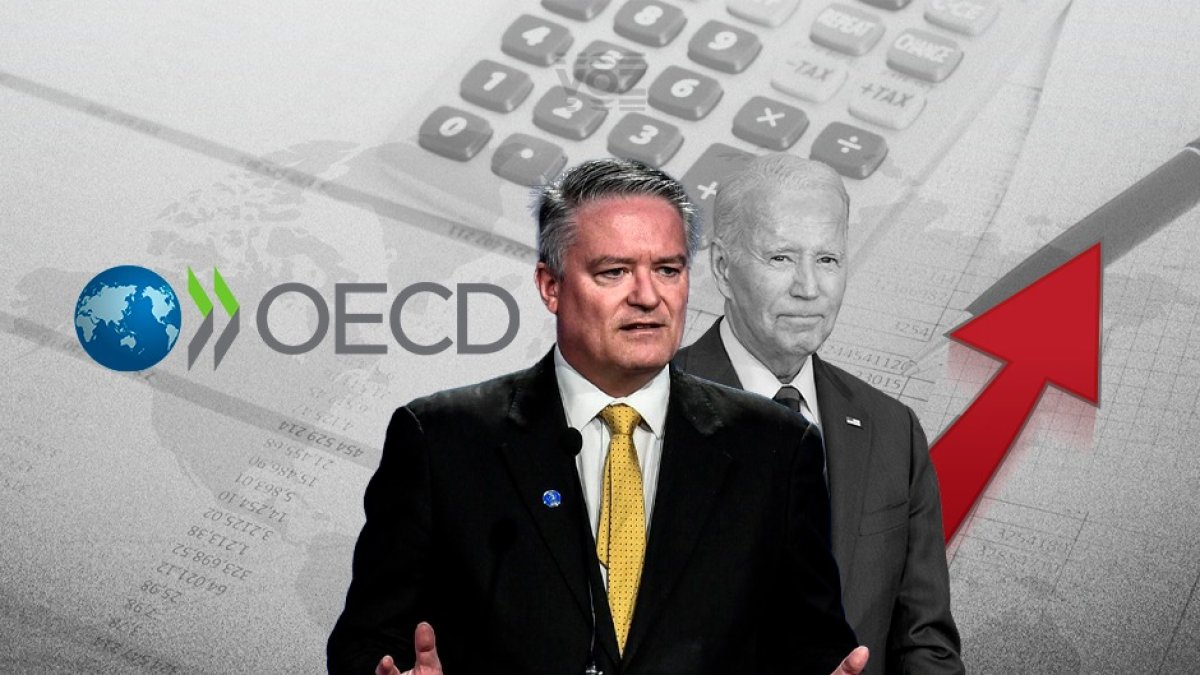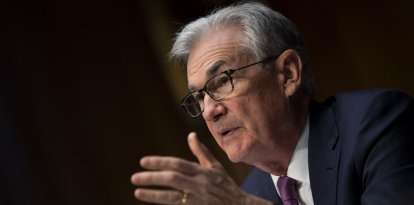An international tax cartel? The OECD proposes imposing a 15% global tax on multinational corporations
Congress must decide in 2025 whether to join this dangerous proposal that will eliminate tax competition.

Diseño Voz Media
The Organization for Economic Co-operation and Development (OECD) has proposed a new global tax system that increases global taxes on multinational corporations and would create a kind of international tax cartel. About 140 countries, including the United States, have already backed the project. Congress must decide on the matter in 2025. The election of American legislators will not only have a huge impact on the economy of this country but also on what happens worldwide since implementing the OECD proposal would seriously affect international tax competition.
The OECD, instead of promoting international trade cooperation, seems to have become an institution that promotes punishing companies with high taxes and undermining the freedom of each country to establish its own fiscal and tax rules. The issue is of supreme importance because by moving towards the elimination of tax competition between countries, a global tax cartel would be created that harms economic growth and the well-being of society, which needs strong companies as they are the source of employment and producers of goods and services.
The new global tax system proposed by the OECD
The OECD, mistakenly, believes that tax competition is harmful to its redistribution objectives. It will push tax rates to the lowest level, which is why it intends to establish a global minimum tax and eliminate competition and tax diversity.
The project proposes a system to tax certain types of corporate income based on where the companies' consumers are located and not based on where the multinational corporations are located. Specifically, the OECD establishes that taxing rights on 25% of the residual profits of the largest and most profitable multinational companies will be reallocated to the jurisdictions where the clients and users of those companies are located.
The second pillar of this proposal consists of establishing a global minimum tax of 15% for all multinational companies with annual income greater than $825 million. For Adam N. Michel, Director of Tax Policy Studies at the Cato Institute, this OECD proposal should be understood as "a step toward establishing an international tax cartel."
Congress will have to decide in 2025. American legislators will have to decide whether to collaborate with the OECD and establish a kind of cartel that eliminates tax competition and undermines the freedom of countries to establish their own rules. If they decide to go a different way and even manage to stop the OECD initiative, they'll need to make it clear to the entire world that the path to prosperity is not to brutally punish businessmen but quite the opposite: the importance of generating an environment where business activity flourishes and, consequently, jobs increase and living conditions improve.
What do the experts say?
Voz Media spoke with Adam N. Michel, director of Fiscal Policy Studies at CATO Institute, who has done extensive research regarding the OECD proposal. According to Michel, "the consequences of the U.S. joining the OECD tax system would be negative on many fronts. The OECD’s global tax system is primarily aimed at increasing taxes on American businesses and redistributing portions of the U.S. tax base to Europe and beyond. This is a lose-lose where U.S. businesses pay higher taxes, and the U.S. Treasury receives less revenue. Joining the OECD tax increases would provide additional legitimacy for the tax cartel and ensure it will expand in the future."
One of the biggest lies that the left has fabricated when it comes to economic matters is that high taxes on companies are necessary and are even the fundamental pillar to redistribute and lift millions of people out of poverty. The reality is that the data shows that the best way to end poverty is by generating employment. A country without companies is a poor country. And high taxes, as well as bureaucratic obstacles, destroy companies.
The OECD proposal would have negative consequences on the poorest of the poor. Some politicians believe that increasing taxes on multinational corporations reduces poverty. However, Michel said that "tax increases on the world’s largest employers are particularly harmful to the poorest Americans (as well as workers around the world). As the OECD and other international organizations admit, these tax increases will undermine the types of global investments that are important for economic expansion, wage growth, and employment gains."
The fiscal policy expert also spoke about what the global economy is experiencing and that makes the OECD proposal even more harmful: "At a time when major economies are likely entering recession—Japan, Germany, the UK—now is perhaps one of the worst times to embark on a worldwide tax-hiking campaign."
Voz Media also spoke with economist Daniel Lacalle, investment manager and expert in fiscal policy. When discussing the consequences that the OECD plan will have particularly on the United States, he stated that it means "an enormous impact on small and medium-sized businesses, which are the largest number in the U.S. (almost 90% of companies) and which would suffer from not being able to reduce their tax bill in difficult periods." He also highlighted that "the debate on the minimum corporate tax is an interventionist fallacy that ignores all the taxes that companies have to pay before reaching the corporate tax."
When it comes to the decision that Congress must make in 2025 regarding whether to accept the OECD's proposal, leading to the beginning of a global tax cartel, Lacalle believes that "the United States must preserve its fiscal independence and move away from global interventionist initiatives that, furthermore, are not going to be applied in China or India even if their leaders say so in public."
Finally, Lacalle highlighted that "the evidence in the U.S. is that lowering taxes has strengthened collection. Additionally, if we take all taxes (not just corporate taxes) the evidence shows that companies pay a lot of taxes and are key to a well-functioning tax system." He added that politicians who want to raise taxes on multinational corporations and adhere to the OECD plan must take into account that "These measures destroy what they pretend to protect. The collection effect is very low and the impact on the creation and development of companies is severe."
Why is tax competition important?
One of the most important factors when determining where a company will be located is the country's tax system. Of course, companies look for places where taxes are not so high and where the tax system is simple; a complex system can involve a lot of time, not to mention money spent on lawyers and accountants. Countries are incentivized to try to offer friendly panoramas to companies to attract international capital. This generates employment and also contributes to taxes.
In any kind of market, competition increases efficiency. Companies, for example, are constantly trying to lower prices or improve the quality of their products to compete with other businesses. This constant bidding means that consumers can have increasingly better goods and services at lower prices. But if there were no competition, companies would have no incentive or need to improve their products or look for more competitive prices.
The same thing is true with the tax system. Governments know that companies can move their locations depending on the tax system of each place, therefore they must compete among themselves to win those investments and attract them to their country. What happens if you destroy competition and all countries establish the same tax system? That is what is commonly known as a cartel, and it would mean that powerful governments have agreed to eliminate competition and establish a single tax rate to the detriment of companies. The harm will then be transferred to individuals.
It is important to understand that tax competition does not make taxes disappear but it does exercise a kind of control, exercised by the market itself. This prevents the tax burden from rising to levels that destroy companies. Thanks to tax competition, the global average corporate tax rate decreased from 39% in 1980 to 22% in 2022.
However, this does not mean that governments' income from corporate taxes has fallen. They have actually increased. This should make institutions such as the OECD change their minds about increasing taxes on multinational corporations since that tax competition is going to destroy tax collection.
At the same time, the average corporate tax rate has decreased since 1980. Corporate tax revenues, as a share of the economy, have also increased since that time. They made up 8.6% of total revenue in 1981 and rose to 9.4% of total revenue in 2021. This figure is even more surprising if one takes into account that the average corporate income tax rate in OECD countries fell by 48% from 1980 to the present.
This phenomenon of increasing revenue while the tax rate falls has been widely studied in economics. An investor-friendly environment allows businesses to grow, so the taxpayer base also expands. Another important factor is that lowering taxes makes it less attractive and beneficial to look for ways to avoid them.
























